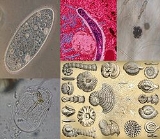
Protist
Overview
Protists are a diverse group of eukaryotic
microorganism
s. Historically, protists were treated as the kingdom
Protista, which includes mostly unicellular
organism
s that do not fit into the other kingdoms, but this group is contested in modern taxonomy. Instead, it is "better regarded as a loose grouping of 30 or 40 disparate phyla
with diverse combinations of trophic modes, mechanisms of motility, cell coverings and life cycles."
The protists do not have much in common besides a relatively simple organization—either they are unicellular, or they are multicellular
without specialized tissues
.
Eukaryote
A eukaryote is an organism whose cells contain complex structures enclosed within membranes. Eukaryotes may more formally be referred to as the taxon Eukarya or Eukaryota. The defining membrane-bound structure that sets eukaryotic cells apart from prokaryotic cells is the nucleus, or nuclear...
microorganism
Microorganism
A microorganism or microbe is a microscopic organism that comprises either a single cell , cell clusters, or no cell at all...
s. Historically, protists were treated as the kingdom
Kingdom (biology)
In biology, kingdom is a taxonomic rank, which is either the highest rank or in the more recent three-domain system, the rank below domain. Kingdoms are divided into smaller groups called phyla or divisions in botany...
Protista, which includes mostly unicellular
Unicellular organism
A unicellular organism, also known as a single-celled organism is an organism that consists of only one cell, in contrast to a multicellular organism that consists of multiple cells. Historically simple single celled organisms have sometimes been referred to as monads Prokaryotes, most protists,...
organism
Organism
In biology, an organism is any contiguous living system . In at least some form, all organisms are capable of response to stimuli, reproduction, growth and development, and maintenance of homoeostasis as a stable whole.An organism may either be unicellular or, as in the case of humans, comprise...
s that do not fit into the other kingdoms, but this group is contested in modern taxonomy. Instead, it is "better regarded as a loose grouping of 30 or 40 disparate phyla
Phylum
In biology, a phylum The term was coined by Georges Cuvier from Greek φῦλον phylon, "race, stock," related to φυλή phyle, "tribe, clan." is a taxonomic rank below kingdom and above class. "Phylum" is equivalent to the botanical term division....
with diverse combinations of trophic modes, mechanisms of motility, cell coverings and life cycles."
The protists do not have much in common besides a relatively simple organization—either they are unicellular, or they are multicellular
Multicellular organism
Multicellular organisms are organisms that consist of more than one cell, in contrast to single-celled organisms. Most life that can be seen with the the naked eye is multicellular, as are all animals and land plants.-Evolutionary history:Multicellularity has evolved independently dozens of times...
without specialized tissues
Tissue (biology)
Tissue is a cellular organizational level intermediate between cells and a complete organism. A tissue is an ensemble of cells, not necessarily identical, but from the same origin, that together carry out a specific function. These are called tissues because of their identical functioning...
.
Unanswered Questions

